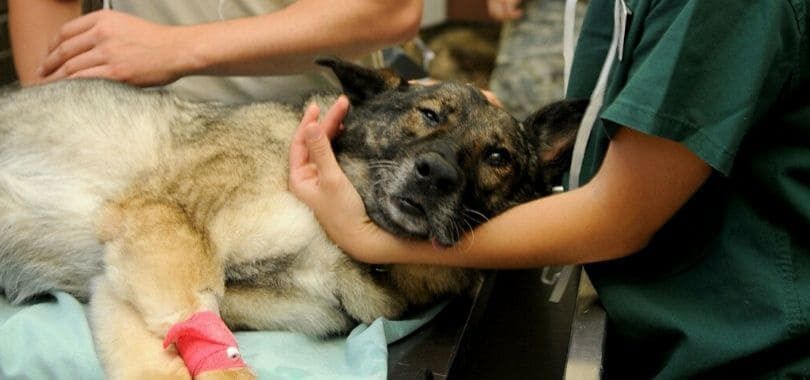Do you love animals, science courses, and healthcare? If so, looking into schools with majors for veterinarians might be the right path for you.
Veterinarian schools are notoriously difficult to get into, but it’s possible. In fact, thousands of applicants are accepted annually. Veterinary programs do however require specific prerequisite courses, so choosing the right undergraduate major early in your educational career is important.
Though you don’t have to be a pre-vet major and can technically get accepted without a degree (as long as you’ve taken the necessary classes), few do (only 1-2%). Most pre-veterinary students will have at least a bachelor’s degree, with many even having a master’s or doctoral degree, before continuing this career path in the veterinary field.
So, if you choose to obtain an undergraduate degree before applying to veterinarian school, do you know what major will best increase your chances of acceptance? Here are four good undergraduate majors for future veterinarians:

Undergraduate Majors for Veterinarians
1. Veterinary Science
Veterinary science is a great degree if you want to become a vet because it’s designed specifically for those looking to go on to vet school. It also covers most required prerequisites. They may call this major something else at your college, such as veterinary and biomedical sciences.
For this veterinary degree, you’ll take organic chemistry, biochemistry, lab, biology, physics, and related math classes. Other courses may include animal science, nutrition, and genetics. Not all colleges will have this specific major, though. Those that do may require you to maintain a certain GPA to stay in the program. Speak with your academic advisor to see which version of this degree is available at your school.

2. Biology
A major for veterinarians offered in various colleges and universities that will help you get into vet schools is biology or biological science. This undergraduate degree program usually focuses on general biology, but you’ll also take courses in other science-related subjects.
As a biology major, you’ll also take physics, chemistry, math, and organic chemistry classes. The kind of required classes depends on the school and the biology program. Ensure your school offers all the vet school prerequisite classes before deciding on a major.
3. General Science
You can also opt for general science majors at your college to go on to become a vet. These vary from college to college, but they will cover everything you need under the science umbrella. As with biology, you’ll have to be sure this coursework covers the prerequisite coursework.
4. Zoology or Zoological Medicine
Another great undergraduate major for veterinarians is zoology. This is especially true for those looking to work as a zoo veterinarian. However, those interested in being a local veterinarian can also benefit from this academic program. Your undergraduate coursework will include studying various zoo animals, behavioral ecology, wildlife biology, behavior, anatomy, mammalogy, evolution, and chemistry.
Prerequisites for Vet School
Like medical school, veterinarian school requires college students to take certain college courses throughout college. You don’t have to necessarily major in anything specific to get into vet school (though the four majors for veterinarians we mentioned are your best bet) as long as you complete the required courses.
Each vet school has similar prerequisite classes and admission requirements, but if you’re wondering about your specific dream school’s requirements, this prerequisite chart from the American Association of Veterinary Medical Colleges will show you exactly that. The AAVMC also has tips on applying to vet school, funding your degree, and other resources for future veterinarians like you.
See top colleges for veterinarians.
Tips for Getting into Veterinary School
1. Build Your Resume
Your grades aren’t the only factor when being considered for admission at a vet school. Your involvement with animals, extracurricular activities, and real-life experiences in veterinary services will help build your resume for a better chance of acceptance. We suggest volunteering at a local animal shelter, working at an animal hospital, or getting involved with veterinary clinics near you.
2. Double-Check Prerequisites
Your major may not cover every prerequisite for the vet school you want to attend, so it’s important to check that you meet all the entrance requirements before applying. This will save you time, money, and a huge headache during your application process. Using the prerequisite chart will help you compare schools too. Whether you decide to choose Tufts University, Ross University, or the University of Florida, all of the important information is in that chart.
3. Network With Other Vet Students
When applying to vet school, hearing from current students who have gone through the same process as you is helpful. They can advise you on your application, help you with tweaking your resume, or introduce you to someone who already works at a veterinary practice.
4. Get Recommendation Letters Early
Recommendation letters are crucial to your grad school applications. Getting them early in your application process will save you time trying to find a professor to write one for you. When you get it done early, you won’t have to worry about it anymore and can get it from the professors you want it from.
5. Apply to Multiple Schools
Veterinarian school is very competitive, so we suggest applying to at least three of them. If you don’t get the school you want, having backup schools on hand will save you a lot of stress. You can also see the financial aid package you’ll receive from each one and choose a school you didn’t think you would attend because they gave you more money.
If you’re considering becoming a veterinarian, we highly suggest considering your undergraduate major seriously.
Want to know which colleges are best for becoming a vet? Check out our free College Search Tool and then use our Scholarship Match Tool to find FREE money for school!





